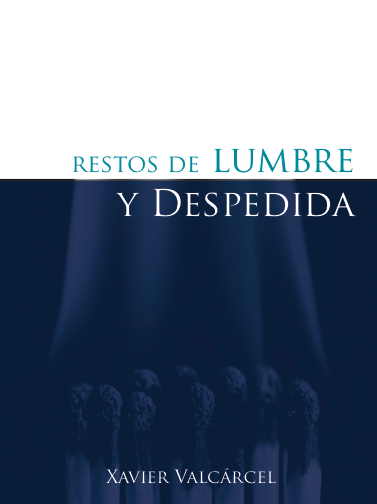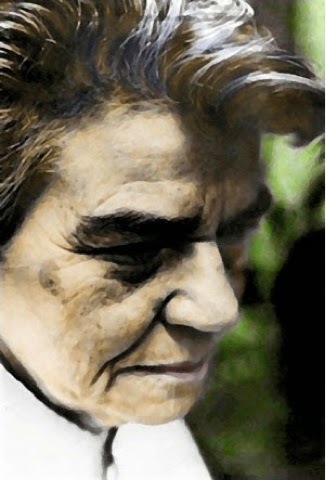Sergio Gutiérrez Negrón's Blog, page 22
November 23, 2014
Hoy es el día número 61 después del fin del mundo, reseña de "Restos de lumbre y despedida" de Xavier Valcárcel

Hoy es el día número 61
después del fin del mundo , reseña
de Restos de lumbre y despedida, de
Xavier Valcárcel.
Hoy en las noticias, Crítica de Libros, Radio
Universidad de Puerto Rico (11/24/2014)
Sergio Gutiérrez Negrón
Restos de lumbre y despedida de Xavier Valcárcel es una de las piezas centrales
para entender la poesía puertorriqueña de la pasada media década. Este libro
del 2012 acompaña a los últimos de Guillermo Rebollo Gil, Mara Pastor, Cindy
Jiménez Vera, Nicole Cecilia Delgado y Rubén Ramos en lo que bien pudiera ser
la línea de fuga más importante de nuestra más reciente historia literaria. Una
línea de fuga ante la cual la poesía se arriesga a desatender aquello que se le
hace más inmediato, por eso de estrechar filiaciones subterráneas que la
hermanan más a lo podríamos llamar simplemente "el pensar". Si entre decenas
de poetas, es la poesía de los cinco antes mencionados que ha llevado a cabo la
reflexión más sostenida sobre la crisis actual, es la de Valcárcel la que,
entre estas, se arriesga más abalanzándose al futuro, aunque sea este un futuro
en el que toda la arquitectura de la modernidad yazca en ruinas.
En este libro,
Valcárcel elabora una imaginería que corta por lo dura, por lo inclemente, como
cuando escribe: "En tiempos como estos / es bueno tener la tierra así/ un
pastizal seco / para el fuego" (46). Hay muchas formas de leer Restos de lumbre y despedida, y en una
de estas, el poemario se abre como un jardín postapocalíptico, como un almacén
en el que encontramos las sobras de lo por venir. En otro poema, escribe
Valcárcel: "visible el brillo quemado de esta altura / el hambre, las
cifras, la deuda / la desolación/ tras el consumo / lo posible tras el mar / la
piedra seca / la frontera."
De muchos modos,
Restos de lumbre y despedida es un poemario sobre la escasez, y
precisamente porque ante la crisis, la política se revela meramente como la
administración de la necesidad y de la falta, se trata de un poemario político.
Sin embargo, podríamos afirmar que no es una política que se rige por principio
alguno; sino una que, en tanto poesía, no puede sino ser salvaje. Vemos así que
aunque Restos de lumbre incluye entre
sus poemas una serie de inventarios, de listados que nos hablan tanto de la
sobresaturación informática del presente como de la necesidad de una apertura
radical, el poeta insiste en explicarnos, en otro poema, que, a pesar de sus
enumeraciones, permanece en espera de la lógica que les dé significado a todas,
una lógica que inevitablemente sólo puede venir de los demás.
Valcárcel nos
explica, en un texto que bien podría servirle de arte poética a la tradición
alterna en que se inserta, que en Restos de Lumbre y despedida la poesía
es también registro, es también documentación. Por eso, podemos cerrar esta
reseña, con un fragmento en el cual el poeta nos dice lo que sabemos pero no
decimos, "Estamos ante las circunstancias que nos dieron. / Estamos ante
las circunstancias que nos dimos: silencio crudo, confusión de puertas /
sujetos en lucha reclamando la ceniza de los sueños".
Published on November 23, 2014 15:00
November 10, 2014
dejar de hacer, dice Vicens
 "Que sea un dejar de hacerlo, no un no hacerlo. Parece lo mismo, ya sé que parece lo mismo. ¡Es desesperante! Sin embargo, sé que no es igual. Por lo contrario, sé que es absolutamente distinto, terriblemente distinto. Porque dejar de hacerlo quieres decir haber caído y, no obstante, haber salido de ello. Es la verdadera victoria. El no hacerlo es una victoria demasiado grande, sin lucha, sin heridas," dice Josefina Vicens, en El libro vacío.
"Que sea un dejar de hacerlo, no un no hacerlo. Parece lo mismo, ya sé que parece lo mismo. ¡Es desesperante! Sin embargo, sé que no es igual. Por lo contrario, sé que es absolutamente distinto, terriblemente distinto. Porque dejar de hacerlo quieres decir haber caído y, no obstante, haber salido de ello. Es la verdadera victoria. El no hacerlo es una victoria demasiado grande, sin lucha, sin heridas," dice Josefina Vicens, en El libro vacío.
Published on November 10, 2014 16:54
November 9, 2014
una dura retrospectiva, escribe williams

Dispassionately, reasonably, he contemplated the failure that his life must appear to be. He had wanted friendship and the closeness of friendship that might hold him in the race of mankind; he had had two friends, one of whom had died senselessly before he was known, the other of whom had now withdrawn so distantly into the ranks of the living that...
He had wanted the singleness and the still connective passion of marriage; he had had that, too, and he had not known what to do with it, and it had died. He had wanted love; and he had had love, and had relinquished it, had let it go into the chaos of potentiality. Katherine, he thought. "Katherine."
And he had wanted to be a teacher, and he had become one; yet he knew, he had always known, that for most of his life he had been an indifferent one. He had dreamed of a kind of integrity, of a kind of purity that was entire; he had found compromise and the assaulting diversion of triviality. He had conceived wisdom, and at the end of the long years he had found ignorance. And what else? he thought. What else?
What did you expect? he asked himself.
Published on November 09, 2014 07:45
November 8, 2014
when is a life worth living, pregunta williams

He had come to that moment in his age when there occurred to him, with increasing intensity, a question of such overwhelming simplicity that he had no means to face it. He found himself wondering if his life were worth the living; if it had ever been. It was a question, he suspected, that came to all men at one time or another; he wondered if it came to them with such impersonal force as it came to him. The question brought with it a sadness, but it was a general sadness which (he thought) had little to do with himself or with his particular fate; he was not even sure that the question sprang from the most immediate and obvious causes, from what his own life had become. It came, he believed, from the accretion of his years, from the density of accident and circumstance, and from what he had come to understand of them. He took a grim and ironic pleasure from the possibility that what little learning he had managed to acquire had led him to this knowledge: that in the long run all things, even the learning that let him know this, were futile and empty, and at last diminished into a nothingness they did not alter.--escribe John Williams, en Stoner. Leí la novela hace un año y, porque seguía pensando en ella, quise buscar en el blog cuáles citas había subido. Me sorprendió descubrir que ninguna. Esta semana entera se la dediqué al libro de Williams. Mañana, cuelgo el fragmento que, entre todos los golpes que componen el libro, quizás es el más duro.
Published on November 08, 2014 07:51
pedagogía, piensa williams

He felt himself at last beginning to be a teacher, which is simply a man to whom his book is true, to whom is given a dignity of art that has little to do with his foolishness or weakness or inadequacy as a man.--escribe John Williams, en Stoner. Leí la novela hace un año y, porque seguía pensando en ella, quise buscar en el blog cuáles citas había subido. Me sorprendió descubrir que ninguna.
Published on November 08, 2014 07:48
November 7, 2014
academia as tragic dwelling, dixit williams

It's for us that the University exists, for the dispossessed of the world; not for the students, not for the selfless pursuit of knowledge, not for any of the reasons that you hear. We give out the reasons, and we let a few of the ordinary ones in, those that would do in the world; but that's just protective coloration. Like the church in the Middle Ages, which didn't give a damn about the laity or even about God, we have our pretenses in order to survive. And we shall survive - because we have to. --escribe John Williams, en Stoner. Leí la novela hace un año y, porque seguía pensando en ella, quise buscar en el blog cuáles citas había subido. Me sorprendió descubrir que ninguna. Así que por los próximos días, acá estaré poniendo unos cuantos pedazos del proceder del Señor Williams.
Published on November 07, 2014 07:34
November 6, 2014
william stoner and john williams think about war

1. A war doesn’t merely kill off a few thousand or a few hundred thousand young men. It kills off something in a people that can never be brought back. And if a people goes through enough wars, pretty soon all that’s left is the brute, the creature that we—you and I and others like us—have brought up from the slime.
2. “You must remember what you are and what you have chosen to become, and the significance of what you are doing. There are wars and defeats and victories of the human race that are not military and that are not recorded in the annals of history. Remember that while you're trying to decide what to do.”
--escribe John Williams, en Stoner. Leí la novela hace un año y, porque seguía pensando en ella, quise buscar en el blog cuáles citas había subido. Me sorprendió descubrir que ninguna. Así que por los próximos días, acá estaré poniendo unos cuantos pedazos del proceder del Señor Williams.
Published on November 06, 2014 07:32
November 5, 2014
la inteligencia afectiva, dixit williams

In his extreme youth Stoner had thought of love as an absolute state of being to which, if one were lucky, one might find access; in his maturity he had decided it was the heaven of a false religion, toward which one ought to gaze with an amused disbelief, a gently familiar contempt, and an embarrassed nostalgia. Now in his middle age he began to know that it was neither a state of grace nor an illusion; he saw it as a human act of becoming, a condition that was invented and modified moment by moment and day by day, by the will and the intelligence and the heart. --escribe John Williams, en Stoner. Leí la novela hace un año y, porque seguía pensando en ella, quise buscar en el blog cuáles citas había subido. Me sorprendió descubrir que ninguna. Así que por los próximos días, acá estaré poniendo unos cuantos pedazos del proceder del Señor Williams.
Published on November 05, 2014 07:27
November 4, 2014
la lección tardía de william stoner, dixit williams

In his forty-third year William Stoner learned what others, much younger, had learned before him: that the person one loves at first is not the person one loves at last, and that love is not an end but a process through which one person attempts to know another. --escribe John Williams, en Stoner. Leí la novela hace un año y, porque seguía pensando en ella, quise buscar en el blog cuáles citas había subido. Me sorprendió descubrir que ninguna. Así que por los próximos días, acá estaré poniendo unos cuantos pedazos del proceder del Señor Williams.
Published on November 04, 2014 07:23
November 3, 2014
el abigarramiento de todo lo no leído, escribe williams

Sometimes, immersed in his books, there would come to him the awareness of all that he did not know, of all that he had not read; and the serenity for which he labored was shattered as he realized the little time he had in life to read so much, to learn what he had to know.
--escribe John Williams, en Stoner. Leí la novela hace un año y, porque seguía pensando en ella, quise buscar en el blog cuáles citas había subido. Me sorprendió descubrir que ninguna. Así que por los próximos días, acá estaré poniendo unos cuantos pedazos del proceder del Señor Williams.
Published on November 03, 2014 07:20



